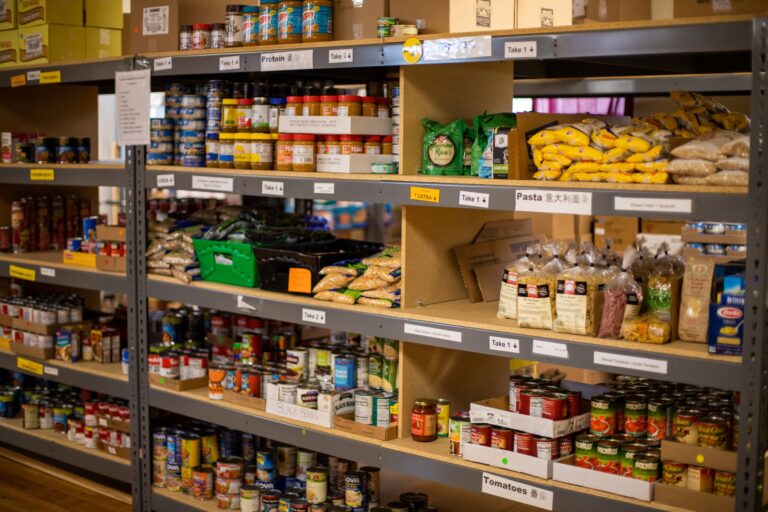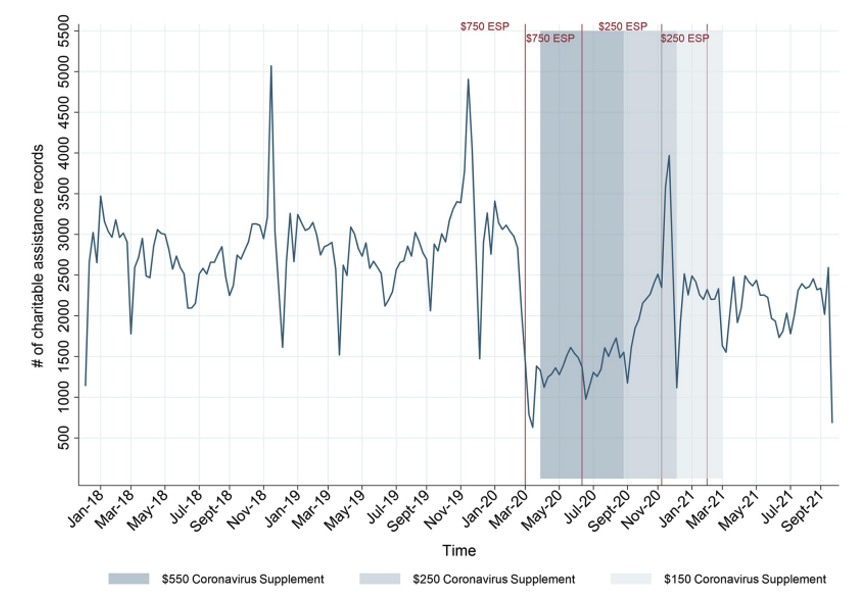Welfare or charity? What is the most effective mechanism for government to directly assist people in poverty to meet their essential needs such as food, clothing, and shelter? This is a question at the heart of our recent study investigating the association between government income support payments and people’s need to use charity.
In our study, we leveraged our partnerships within the charitable sector to examine how temporary increases in government income support due to COVID-19 influenced people’s need to use charity. We found a robust negative relationship between the level of additional income support provided by government and the number of requests for charitable assistance. The higher the level of additional income support provided, the larger the reduction in people’s need to use charity.
Income support temporarily rose in the wake of COVID-19
The COVID-19 pandemic triggered a number of temporary reforms in Australian welfare policy.
In 2020, the Australian Government launched two economic stimulus packages to supplement existing income support payments. The first package was released on 31 March 2020, and consisted of a lump-sum AUD$750 Economic Support Payment for existing income-support recipients. The second package was released on 13 July 2020 and included the Coronavirus Supplement and a second AUD$750 Economic Support Payment for those who were ineligible for the Supplement.
Two other lump-sum payments amounting to AUD$250 each were issued on 30 November 2020 and 1 March 2021 to those who were ineligible for the Supplement.
Unlike the four lump-sum payments, the Coronavirus Supplement was paid at regular fortnightly intervals between April 2020 and March 2021. From 27 April to 24 September 2020, the Supplement was set at AUD$550 per fortnight. It was subsequently reduced to AUD $250 per fortnight from 25 September to 31 December 2020, and further reduced to AUD$150 per fortnight from 1 January to 31 March 2021 after which it was discontinued.
Altogether, these reforms boosted the incomes of a significant share of the population, albeit temporarily. There is evidence suggesting that the additional payments not only prevented poverty from worsening as a direct result of COVID-19, but also reduced pre-pandemic poverty rates. Given the role of charity in helping people experiencing poverty, we expected the payments to reduce the need for people to seek charity.
Coronavirus Supplement, not lump-sum payments, made the difference
We worked closely with Queensland’s two largest charities – St Vincent de Paul Society Queensland and The Salvation Army – to examine how the Coronavirus Supplement and the lumpsum Economic Support Payments influenced people’s requests for charitable assistance.
Specifically, we combined information on the timing and level of temporary increases in income support payments during the peak of the pandemic in 2020 and 2021 with data on the number of requests for assistance made to St Vincent de Paul Society Queensland and The Salvation Army.
Our analysis showed that there is a direct relationship between the level of government income support and people’s demand for charity. Our findings showed that the demand for charitable assistance dropped markedly over the period when the Coronavirus Supplement was in place compared to pre-pandemic levels (Figure 1).
The reduction in the demand for charitable assistance was largest when the Coronavirus Supplement was at its highest level. Our estimates suggest that the $550 Coronavirus Supplement was associated with a 47% reduction in requests for charitable assistance, whereas the $150 Coronavirus Supplement was associated with a much smaller reduction of 8%.
Importantly, our analysis also showed that it was the sustained nature of the Coronavirus Supplement that really made a difference to people’s need for charity. While the fortnightly Coronavirus Supplements unequivocally reduced demand for charity, there was little evidence that the one-off lump-sum payments made a difference.
Figure 1. Number of weekly assistance records (2018-2021). This figure combines the number of weekly assistance records from both charities. Amounts are in Australian dollars. ESP – Economic Support Payment. https://doi.org/10.1371/journal.pone.0287533.g002
Rethinking the role of charity in a cost-of-living crisis
Our research demonstrates that people’s need for charity is a direct result of policy decisions to keep income support below the poverty line. However, it also shows that government is fully capable of increasing the generosity of the welfare system and, in doing so, address the structural causes of poverty.
In Australia, we have both the resources and knowledge to address poverty, but we lack the political will. These findings now hold extra weight given Australia’s current cost-of-living crisis, which is forcing more and more people to access charity to survive.
Our study calls for sustained increases in government income support payments, made directly to people in need to cover essentials such as food, clothing and rent, as a fairer, transparent, and efficient mechanism to promote self-determination and control over one’s life.
For people who rely on charity to meet their basic needs, increasing income support eliminates barriers to obtaining essential goods and services, including the stress, shame and stigma associated with presenting to charity. It also maximises their ability to exercise agency and live with dignity.
The capacity that would be freed up by increasing levels of government income support will also allow charities to better assist other vulnerable groups, such as refugees, who may fall through the cracks of the welfare system. It will also allow them to focus on building communities and creating solidarity among diverse populations.
Further, charities would also be better enabled to continue and increase their advocacy for structural reform to prevent injustices. The legitimacy of many charities, a legitimacy that is derived from their work with people living in poverty, provides them a significant opportunity to push for the political will that is needed to end poverty.
Finally, sustained increases in income support payments would also enable governments to move from providing ‘band-aid’ solutions to poverty, and redirect efforts to tackle its structural root causes, rather than just addressing its symptoms.
Increasing income support so that people live above the poverty line is not thus simply a matter of justice. It also serves to create the conditions for people to achieve stability and predictability in life. This in turn enables them practical opportunities to participate in society consistent with their aspirations.
This article is based on our publication: Ablaza C, Perales F, Parsell C, Middlebrook N, Robinson RNS, Kuskoff E, et al. (2023) Increases in income-support payments reduce the demand for charity: A difference-in-difference analysis of charitable-assistance data from Australia over the COVID-19 pandemic. PLoS ONE 18(7): e0287533. https://doi.org/10.1371/journal.pone.0287533







We should not have to ask for charity when the need is forced upon us by government decisions.
Agree. Why throw money at people by public charity after you have reduced their incomes by taxes such as GST on the necessities of life and outrageous monopoly pricing of water, electricity, gas and petrol? Rather like kicking a man into the gutter and then offering him a hand up.